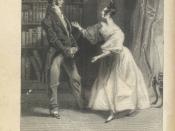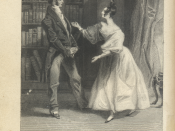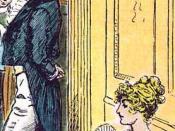"A studier of character": Bias by Narration to Elizabeth Bennet in Pride and Prejudice
"Lizzy, I bear you no ill will for being justified in your advice to me last May, which, considering the event, shews some greatness of mind." (Volume 3, Chapter 6, p. 216) When Lydia, Elizabeth's youngest sister, was invited to go to Brighton with Mrs. Foster and the regiment, Eliza deems it imprudent that she go as she repeatedly displayed herself as an uncontrollable, foolish, vain flirt. Lizzy, having judged and condemned her sister's character and duly warning their father, demonstrates her perception. If we, by this point in the novel, are not already completely under the influence of Elizabeth Bennet's judgment and discretion and wit, we are now captivated by her foresight. Her father's reference to her 'greatness of mind' reinforces what the Narrator says and implies throughout the book: that Eliza is astute, quick, judiciousness.
The narration of Jane Austen's Pride and Prejudice biases the reader to Elizabeth's point of view.
The Narrator's description of Mr. and Mrs. Bennets' characters at the beginning of the book prejudices the reader in Mr. Bennet's favor. Variations of character between the couple, as described by the Narrator, show Mr. Bennet to be the better of the two in mind and manners. "Mr. Bennet was so odd a mixture of quick parts, sarcastic humour, reserve, and caprice, that the experience of three and twenty year had been insufficient to make his wife understand his character. Her mind was less difficult to develop. She was a woman of mean understanding, little information, and uncertain temper. When she was discontented she fancied herself nervous. The business of her life was to get her daughters married; its solace was visiting and news." (Volume 1, Chapter 1, p. 3) These two...


